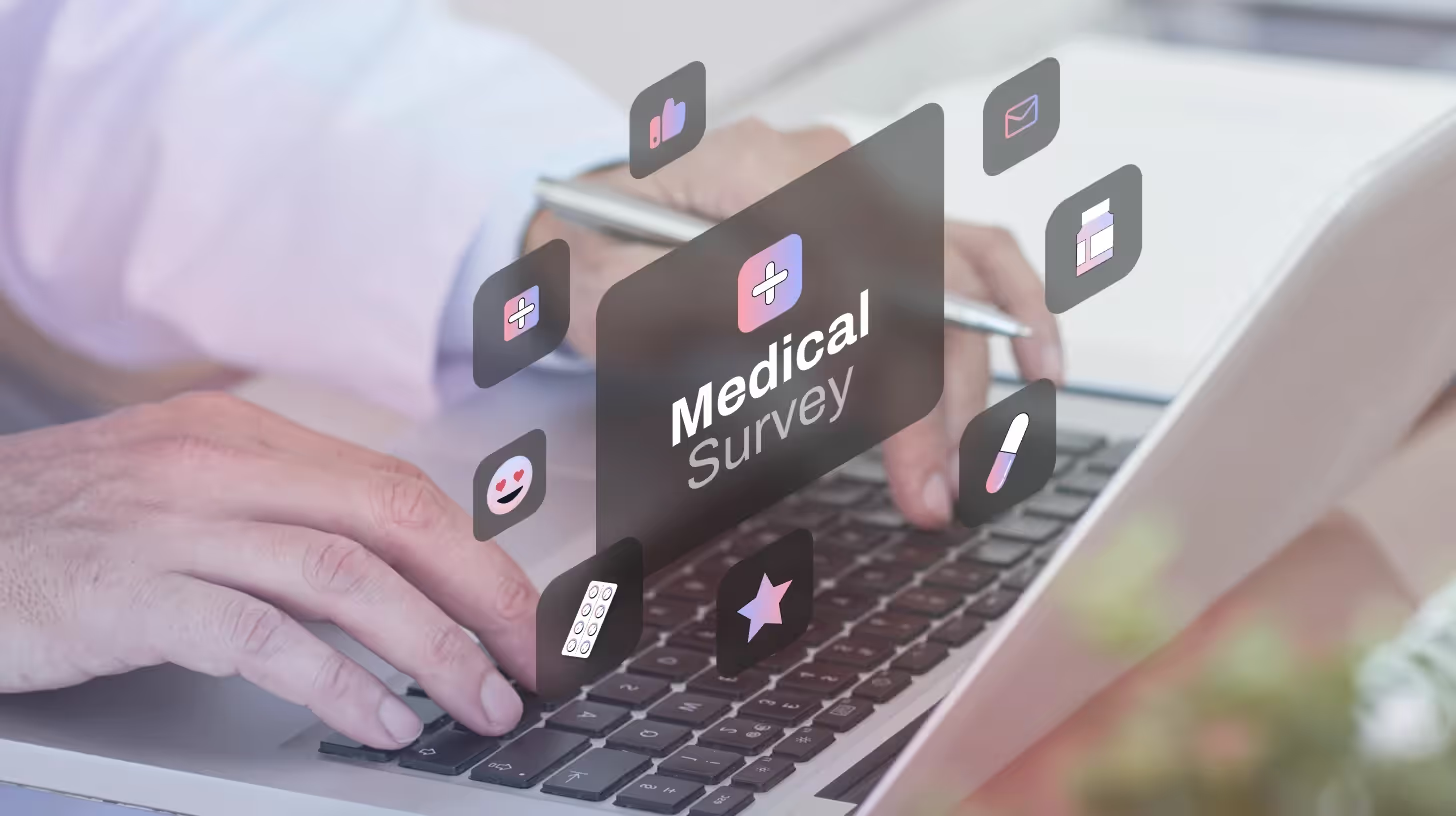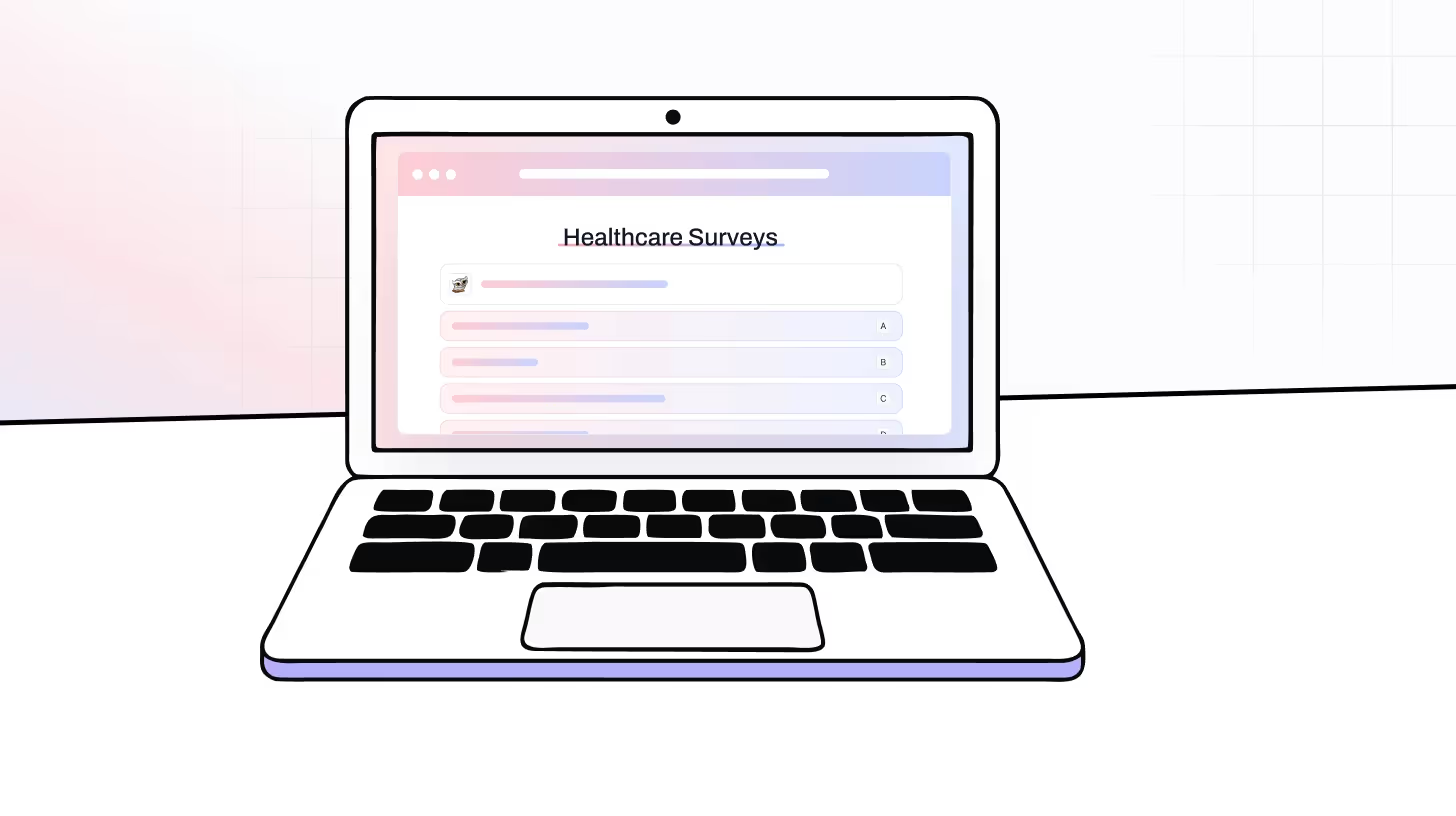How Medical Surveys Are Powering the Future of Healthcare in 2025

Medical Surveys Are Quietly Powering the Future of Healthcare
When was the last time you gave feedback after a doctor’s visit, or wished you could? From the moment a patient walks into a clinic to the second they leave, every experience holds valuable insight. And in 2025, medical surveys are the tools turning those everyday moments into meaningful change.
Whether you're a doctor trying to improve patient satisfaction, a hospital administrator tracking service quality, or a researcher analyzing healthcare trends, surveys are no longer optional; they’re essential.
Keep reading this blog post to learn everything about medical surveys and how they are transforming healthcare in 2025!
What Are Medical Surveys?
Medical surveys are tools used by healthcare providers, researchers, and healthtech companies to gather feedback from patients, doctors, and other stakeholders. At their core, they’re designed to help improve care quality, patient satisfaction, and healthcare outcomes.
Medical surveys come in all shapes and sizes, ranging from quick medical feedback forms after a check-up to in-depth hospital survey questions that track the entire patient experience. Some surveys, like the Medical Expenditure Panel Survey, support large-scale healthcare research, while others are used in day-to-day care or even run as paid medical surveys by pharmaceutical companies.
Types of Medical Surveys (2025)
How Medical Surveys Are Used Across Healthcare
Here’s how different healthcare stakeholders are using medical surveys today:
Doctors & Physicians
For doctors, medical surveys are a powerful way to listen to patients and improve clinical outcomes. They help:
- Measure patient satisfaction
- Identify gaps in care or communication
- Improve appointment experiences and follow-up
- Track physician burnout and workflow efficiency
Doctors who regularly use feedback forms report up to 30% higher patient retention.
Explore more: A Practical Guide to Medical Surveys for Physicians in 2025
Also read: The Rise of Medical Surveys for Doctors in 2025: What You Should Know

Nurses & Clinical Staff
Nurses play a frontline role in patient care, and medical feedback surveys help amplify their voices. Hospitals use surveys to:
- Monitor workplace satisfaction and job stress
- Gather insights on team communication and training needs
- Improve nurse-patient interactions
- Invite nurses to join paid medical surveys and research panels
Check out: Top 10 Medical Survey Portals to Earn Extra Money in 2025
Hospitals & Clinics
Hospitals rely on structured hospital surveys to maintain high-quality care across departments. Key uses include:
- Collecting real-time patient feedback after appointments or procedures
- Monitoring cleanliness, wait times, and staff professionalism
- Improving patient discharge processes and follow-up care
- Running internal staff surveys to identify pain points
Pharmaceutical & Healthcare Companies
For pharma companies and medical tech startups, medical market research surveys are essential for product development and compliance. These surveys are used to:
- Collect feedback from physicians and specialists
- Test new drugs, therapies, or digital health tools
- Measure patient experiences in clinical trials
- Support FDA approval and post-market analysis
Medical surveys shorten product testing cycles by up to 40% through faster feedback loops.
Read more: The Ultimate Guide to Medical Market Research Surveys in 2025
Patients & Caregivers
Patients are at the center of modern healthcare—and patient satisfaction surveys give them a voice. These surveys help:
- Share honest opinions about providers and services
- Influence improvements in care quality
- Report safety issues or service gaps
- Participate in paid medical surveys to support research and earn compensation
Researchers & Policy Makers
Government bodies and researchers rely on large-scale tools like the Medical Expenditure Panel Survey (MEPS) to drive policy decisions. MEPS is used to:
- Track national trends in healthcare spending and usage
- Measure access to care by income, region, or insurance type
- Analyze patient behaviors and health conditions
- Forecast demand for healthcare services
Case Study: U.S. Hospital Survey Data and Surgical Quality
A landmark analysis of over 100,000 Medicare patients found that hospitals with higher performance on patient satisfaction surveys using the standardized HCAHPS model had significantly lower rates of postoperative mortality, failure to rescue, and minor complications. The results underscore that medical surveys, when thoughtfully designed and executed, correlate with real and measurable clinical quality outcomes.
You can read the full case study here.
Traditional vs. AI-Powered Medical Surveys: What’s Really Changed?
The way we conduct medical surveys has undergone significant changes in recent years. Traditional methods such as paper forms and generic hospital survey questions no longer meet the expectations of modern patients or the needs of fast-paced healthcare systems.
Here’s how AI-powered platforms like TheySaid are transforming every layer of the medical feedback process:
Survey Format and Experience
Traditional medical feedback forms are often static and unengaging. Patients fill them out on paper or through long, uninspired email links if they bother at all. In contrast, AI-powered medical surveys use conversational interfaces that feel more like a natural chat. These modern formats are mobile-friendly, personalized, and far more likely to get completed.
Question Logic and Personalization
Older survey systems ask the same list of hospital survey questions to every patient regardless of their situation. AI-based tools dynamically adjust the survey flow based on previous answers, demographics, or visit history. A patient who just received a new diagnosis will receive more relevant follow-up questions than someone there for a routine check-up.
Feedback Quality and Context
Generic surveys typically produce vague, surface-level data. However, modern platforms such as TheySaid utilize natural language processing (NLP) to comprehend emotions, intent, and context. So when a patient writes, “The nurse was a bit cold,” the system can pick up on subtle dissatisfaction and categorize it appropriately.
Response Rates and Timing
Most traditional medical surveys have response rates below 10%—mainly due to poor timing or generic delivery. AI-driven tools like TheySaid send surveys at the right moment, through the right channels, with adaptive language that encourages honest responses. This results in better patient engagement and richer insights.
Data Analysis and Speed
Old-school surveys rely on staff to manually read, sort, and interpret feedback. This takes time and introduces human bias. With AI, thousands of responses can be summarized in minutes. Sentiment trends, recurring complaints, and emerging issues are flagged instantly, allowing healthcare teams to act quickly.
Scalability and Automation
Scaling manual medical feedback processes is nearly impossible without hiring more people. AI platforms automate the entire feedback cycle from collecting to analyzing to alerting making it easier for hospitals and healthtech SaaS companies to manage surveys across departments, facilities, or even countries.
Compliance and Data Privacy
While many traditional systems fall short on secure data handling, modern AI-based solutions are built with privacy in mind. Platforms like TheySaid ensure that sensitive patient data is handled with the highest standards of security.
Use Cases Beyond Clinics
AI-powered systems are also ideal for running paid medical surveys, engaging patients in clinical research, or conducting a Medical Expenditure Panel Survey for policy and budgeting decisions. This versatility makes them a valuable asset not only for hospitals but also for research organizations and healthcare SaaS platforms.

Best Practices for Conducting Medical Surveys
Whether you're collecting patient satisfaction data or running a hospital-wide feedback campaign, these best practices will help you get accurate, actionable results.
Define your survey goal clearly
- Identify if it’s for patient satisfaction, clinical research, staff engagement, or healthcare compliance.
- Keep the survey purpose measurable and tied to outcomes (e.g., improving wait times, reducing patient complaints).
Keep questions short, simple, and relevant
- Use plain language—avoid clinical jargon (unless for medical professionals).
- Include a mix of Likert scale, yes/no, and open-ended questions.
- Example: “How satisfied were you with your care today?”
Use a mobile-friendly, accessible format
- Ensure surveys work on phones and tablets.
- Use large fonts, high contrast, and screen-reader compatibility.
- Translate into local languages for diverse patient groups.
Send surveys at the right time
- Patients: Send within 24–48 hours after discharge or visit.
- Staff: Conduct quarterly or biannual pulse checks.
- Avoid survey fatigue by limiting frequency.
Prioritize patient and staff privacy
- Ensure HIPAA or GDPR compliance for all survey data.
- Allow anonymous responses—especially for staff burnout surveys.
- Use encrypted, secure platforms for distribution.
Track real-time feedback and act on it
- Use live dashboards to monitor satisfaction scores or negative reviews.
- Set up alerts for low scores (e.g., NPS < 6) to trigger quick action.
- Share findings with department leads or hospital admin for follow-up.
Personalize your medical surveys when possible
- Tailor questions by department (e.g., ER, pediatrics, outpatient).
- Use the patient’s name or care info to make it more relevant.
- Include a “Thank You” screen to humanize the experience.
Offer small incentives for better response rates
- Gift cards, discount vouchers, or simple recognition can boost completion.
- Especially helpful for paid medical research surveys or long-form academic studies.
Quick Medical Survey Best Practices Checklist for 2025
- Set a clear goal for your survey
- Define your target audience (patients, physicians, nurses, etc.)
- Use clear, simple language — no jargon
- Ensure compliance with HIPAA, GDPR, or local data laws
- Keep the survey short (ideally under 10 questions)
- Mix question types (multiple choice, rating scales, open-ended)
- Use logic branching or skip patterns where relevant
- Offer incentives for paid medical surveys (e.g., gift cards)
- Test the survey with a small group before going live
- Optimize for mobile and accessibility
- Analyze responses with the right tools (dashboards, exports)
- Communicate findings to relevant stakeholders
Create Smarter Medical Surveys with TheySaid
If you’re ready to move beyond outdated survey tools and clunky feedback forms, TheySaid makes it easy to build smarter, AI-powered medical surveys that actually listen.
With TheySaid, you can create:
- Patient Satisfaction Surveys to improve hospital experiences
- Medical Feedback Forms after appointments or procedures
- Hospital Survey Questions customized to each department
- Paid Medical Surveys for research, pharma, or clinical insights
- Integrated reports aligned with data like the Medical Expenditure Panel Survey
And here’s the game-changer: TheySaid uses conversational AI to ask smarter questions, summarize responses in real time, and flag urgent feedback automatically — no manual review needed.
Whether you're a healthtech product leader, CS lead at a SaaS company, or running feedback loops in a hospital network, TheySaid gives you speed, scale, and signal in one place.
Ready to modernize your medical surveys? Signup with TheySaid and see how effortlessly AI can drive better patient insights.
Key Takeaways
- Medical surveys are essential tools in 2025 for capturing feedback, improving care, and driving healthcare innovation from hospitals to research teams.
- AI-powered platforms like TheySaid make it easy to build smarter, adaptive medical surveys that improve response rates and data quality.
- Different types of medical surveys, from patient satisfaction surveys to paid medical surveys, serve distinct purposes across healthcare roles.
- Modern survey tools personalize questions in real time, analyze emotional tone, and deliver faster insights than traditional forms ever could.
- Hospitals that utilize medical surveys with AI achieve better outcomes, stronger patient trust, and measurable improvements in clinical quality.
FAQs
1. What are medical surveys used for in healthcare?
Medical surveys gather feedback on patient care, satisfaction, and healthcare service quality. Hospitals and clinics use them to improve processes and enhance the overall patient experience.
2. Are paid medical surveys legitimate?
Yes, many research organizations run paid medical surveys to collect real-world insights. Just ensure the survey is from a verified healthcare panel or research firm.
3. How do AI tools like TheySaid improve medical surveys?
AI tools like TheySaid make medical surveys smarter with dynamic questions, emotion analysis, and instant summaries—helping teams get actionable insights faster.
4. What should you include in a patient satisfaction survey?
Include questions about doctor communication, wait time, staff behavior, and overall satisfaction. Use clear, concise hospital survey questions tailored to your facility.
5. How do hospitals use medical survey data?
Hospitals analyze data from medical feedback forms to improve care quality, patient outcomes, and staff training—often using platforms like TheySaid for faster insights.
















.svg)